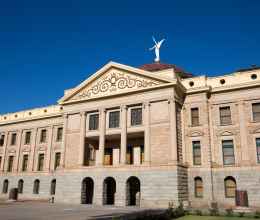
A few days ago, parents, student advocates, and educators came together for a policy summit at Balsz Community Center in Phoenix to develop concrete policies that will help alleviate the problem of schools pushing kids out of the classroom with harsh, and often biased, disciplinary practices.
Identifying policy changes and advocating for them at the Arizona Capitol with school administrators is the next step in the Demand to Learn campaign—an educational, outreach, and advocacy movement focused on eliminating schools’ exclusionary practices. The campaign launched in August and already the ACLU of Arizona has made significant strides, in large part because parents and educators have stood up for students across the state. So far, we have:
- Conducted five advocacy trainings, educating, informing, and empowering over 200 parents to advocate for their children when meeting with school officials;
- Given over 20 presentations to district and charter public school administrations, providing them with technical assistance to change their policies and practices, and signed partnership agreements with nine education systems to address exclusionary practices;
- Given scholarships to 10 students, who gathered over 100 interviews on school discipline that will be turned into a play in partnership with Rising Youth Theater;
- Collected dozens of stories through the ACLU of Arizona website, over social media, and by phone, of families trying to figure out how to make sure that their children are able to continue their educations;
- Assembled a list of more than 500 advocates who have pledged to keep children in classrooms, in key legislative districts;
- Partnered with community organizations, like Valle del Sol, to provide our school partners with resources to address trauma and behavioral health challenges in schools; and,
- Brought in national experts to provide discipline-related trainings for educators, community organizations, and families.
The next step in the Demand to Learn campaign is to identify changes to Arizona laws and regulations that cause students to be pushed out of school. We initiated this identification process by hosting the policy summit at the Balsz Community Center, where we encouraged parents, students, and educators to begin pinpointing problematic policies and mapping out a strategy to get those policies changed. We are also working with our partner schools to develop policies and practices that will not only keep students in school but also help students thrive in school. We are doing that by providing schools technical assistance, reviewing their discipline data periodically, and providing trainings about trauma-informed teaching to administrations and teachers.
Policy change does not happen overnight. But the ACLU of Arizona will fight for as long as it takes to make sure that kids stay in school and that all students are given an equal opportunity to succeed. We all agree that it is fundamentally unfair to treat students differently based on the color of their skin, and yet data shows that extreme disparities exist.
In Maricopa County, African American boys in charter high schools are eight times more likely to be suspended than their white counterparts. For Latino boys, it is six times. The unequal treatment Native American boys receive is staggering – in some district schools close to tribal communities they are 10 times more likely to be suspended or expelled than their white peers. Special education students make up more than 50 percent of the school-based arrests in Maricopa County even though they constitute only about 10 percent of the total student population. Moreover, students with disabilities in elementary and middle schools are twice as likely as students without disabilities to receive in-school suspensions.
This is unacceptable, immoral, and has no place in today’s society. All students deserve to be treated with dignity and respect. Schools have the legal and ethical imperative to educate all of our students. The Arizona constitution makes clear that all students have the right to a public education, which means schools cannot pick and choose who to educate. To hold all public schools accountable and ensure that they are educating all of our students, we are going to need your help to pave the way for real change.
In the coming months, the ACLU of Arizona, with the guidance of our parents, students, and educators, will be developing a policy platform that calls for changes at the local and state levels and mobilizing parents and students to engage in direct action at charter and district school meetings, among many other tactics, to effect change.
We are changing hearts and minds and shaping the conversation around education equity and we could not do this work alone. Together, we will continue advocating for all students—no matter their race, ethnicity, immigration status, or abilities—to receive the education they deserve.
School choice means families choose schools, not the other way around. We want anyone who cares about public education in Arizona to help with our work. For more information, please contact us at demandtolearn@acluaz.org or visit www.demandtolearnaz.org.


